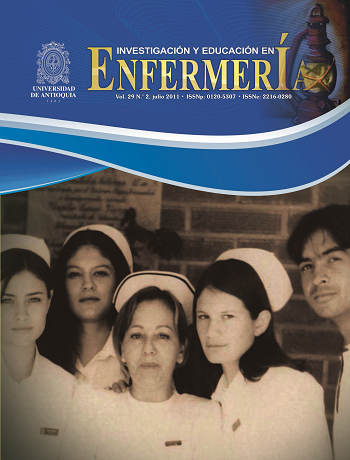Drugaddiction and its role in pedagogical processes, a hidden or an evident problem?
DOI:
https://doi.org/10.17533/udea.iee.6350Keywords:
Substance abuse detection; students; education, professional; teaching; curriculum.Abstract
Objective. To describe the way in which teachers who are being trained perceive and act towards drug-addiction in children, young people and teenagers.
Methodology. Narrative process supported in the comprehensive qualitative paradigm of case studies. Five journals from teachers who were being trained, men and women, who started their internship in official schools of the department of Caldas (Colombia) in groups with an average of 45 students, enrolled from 5th to 9th grade, were used as tools. Journals had stories, interpretations and thoughts about observed cases in the classes and scholar situations. Information was collected between 2006 and 2007.
Results. The dichotomy between the curriculum and the reality experienced by the students is evident. Trainees consider that the knowledge they receive is not enough to train them on how to intervene drug-addiction and health problems in the students, but they recognize these factors as determinants in the pedagogical processes and useful information to work in an interdisciplinary team with other professionals.
Conclusion. Even though theoretically the direct relationship between curriculum, culture and training processes is explained, they don’t have enough and opportune tools to solve physical, mental and emotional health problems, like drug-addiction that affect children, young people and teenagers integral training processes.
Downloads
References
(1) República de Colombia. Congreso de la República de Colombia. Ley 115/1994 de 8 de febrero, por la cual se expide la ley general de educación. Bogotá: El Congreso; 1994.
(2) Taylor S, Bogdan R. Introducción a los métodos cualitativos de investigación. Barcelona: Paidós; 1996.
(3) Stake R. Investigación con estudio de casos. Madrid: Morata; 1998.
(4) Briones G. Investigación en el aula y en la escuela: formación de docentes en investigación educativa. Bogotá: Litográficas Calidad; 1990.
(5) Carr W, Kemmis S. Teoría crítica de la enseñanza; la investigación-acción en la formación del profesorado. Barcelona: Martínez Roca; 1988.
(6) Díaz A. Autopercepción estudiantil sobre su papel en el aprendizaje [Internet]. [acceso 2009 Sep 15]. Disponible en: http://www.anuies.mx/servicios/p_anuies/publicaciones/revsup/res048/.
(7) De Tezanos A. Una etnografía de la etnografía: aproximaciones metodológicas para la enseñanza del enfoque cualitativo-interpretativo en la investigación social. Bogotá: Antropos; 1998.
(8) Goetz J, Lecompte M. Etnografía y diseño cualitativo en investigación educativa. Madrid: Morata; 1988.
(9) Hammersley M, Atkinson P. Etnografía, métodos de investigación. Barcelona: Paidós; 1994.
(10) Quintero J, Buitrago S, Gallego L, Infante G, Pinzón M, Zuluaga C. Cultura, currículo y lengua extranjera. Manizales: Centro Editorial Universidad de Caldas; 2006.
(11) Mejía M. Educación y escuela en el fin de Siglo. Bogotá: CINEP; 1995. p.5.
(12) UNESCO. La Educación encierra un tesoro, Informe de la Comisión Internacional sobre la Educación para el Siglo XXI. Paris: Santillana; 1996.
(13) Magendzo A. Curriculum, educación para la democracia en la modernidad. Programa Interdisciplinario de Investigación en Educación-PIIE. Universidad Academia de Humanismo Cristiano. Instituto para el Desarrollo de la Democracia Luis Carlos Galán. Bogotá: Antropos; 1996. p.47.
Downloads
Additional Files
Published
How to Cite
Issue
Section
License
Derechos de propiedad / Direitos de Propriedade
English: If the article is accepted for publication, all copyright will be of exclusive property of Investigación y Educación en Enfermería. The text and the graphics included in the publication are exclusive responsibility of the authors and not necessarily reflect the thought of the Editorial Committee.
Español: Si el artículo es aprobado para publicación, todos los derechos son de propiedad de Investigación y Educación en Enfermería. El texto y las gráficas incluidas en la publicación son de exclusiva responsabilidad de los autores y no necesariamente refleja el pensamiento del Comité Editorial.
Português: Se o artigo for aceito para publicação, todos os direitos autorais serão de propriedade exclusiva de Investigación y Educación en Enfermería. O texto e os gráficos incluídos na publicação são de responsabilidade exclusiva dos autores e não refletem necessariamente o pensamento do Comitê Editorial.















